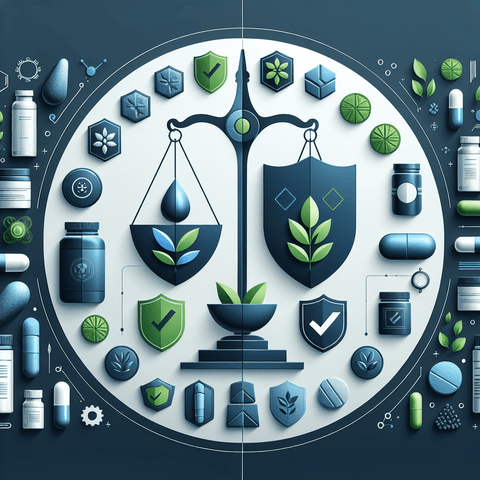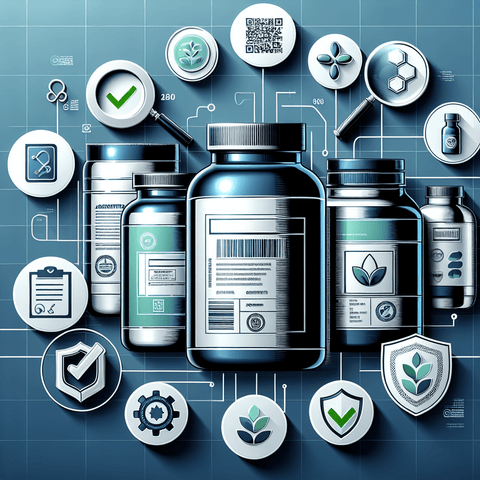In recent years, the supplement industry has experienced explosive growth, reflecting a rising consumer interest in health, wellness, and self-care. Market surveys indicate that a significant majority of adults incorporate dietary supplements into their daily routines, whether to fill nutritional gaps, support energy levels, or enhance overall well-being. However, alongside this burgeoning popularity lies a complex landscape of regulation and safety concerns that consumers often find confusing or opaque. Understanding the intricacies of supplement regulation and safety is crucial for making informed decisions that truly protect your health. This comprehensive guide aims to unravel the truths about supplement oversight, quality assurance, and how to navigate this industry responsibly.
Understanding Supplement Regulation: How the Industry is Monitored and Controlled
The regulatory environment surrounding dietary supplements is fundamentally different from that of pharmaceuticals. Unlike prescription or over-the-counter medications, dietary supplements are classified as food products rather than drugs. This classification means they are regulated under the Dietary Supplement Health and Education Act of 1994 (DSHEA), a legislative framework specific to the United States, which shapes how these products are monitored and enforced. Under DSHEA, the Food and Drug Administration (FDA) oversees supplement safety and manufacturing practices but notably does not approve dietary supplements before they reach the market.
The primary agency responsible for supplement oversight in the U.S. is the FDA — the same authority that regulates foods, drugs, and medical devices. The FDA’s role focuses largely on post-market surveillance, which means that supplements can be marketed provided they do not contain harmful ingredients or make false health claims. Manufacturers are required by law to adhere to Good Manufacturing Practices (GMP), ensuring quality and consistency, but there is no pre-market approval process like the rigorous evaluation drugs undergo before approval. The Federal Trade Commission (FTC) complements the FDA’s regulatory framework by policing advertising claims, ensuring that marketing is not misleading or deceptive.
In this regulatory landscape, the key distinction between dietary supplements and pharmaceuticals is crucial. Drugs undergo extensive clinical trials, detailed review, and approval before they can be marketed for specific health claims. By contrast, dietary supplements can be marketed with structure/function claims (e.g., “supports immune health”) without the need for prior approval, provided these claims are truthful and substantiated. This regulatory difference emphasizes the importance for consumers to remain vigilant about the sources and claims made by supplement brands.
Despite the relatively lighter regulation compared to pharmaceuticals, such oversight is vital for ensuring consumer safety and maintaining product integrity. However, challenges persist, including the potential for contamination, adulteration, and false claims, especially given the regulatory gaps in pre-market scrutiny. Manufacturers may sometimes lack the resources or commitment to rigorous quality control, contributing to safety concerns within the industry. Consumers need to understand this regulatory context to discern trustworthy products from those that may pose health risks.
Dietary Supplement Safety: Ensuring Consumer Well-Being and Trust
In the realm of dietary supplements, safety encompasses several critical aspects — from ingredient quality and purity to truthful labeling and contamination control. The safety of a supplement hinges on meticulous manufacturing processes, accurate ingredient disclosure, and vigilant testing for contaminants like heavy metals, pesticides, or microbial contamination. Because supplements are often produced in complex supply chains, the risk of contamination or adulteration is a real concern, underscoring the importance of consumer awareness and industry accountability.
Common safety concerns include contamination with heavy metals such as lead, arsenic, or mercury, which can occur due to environmental factors in raw materials. Adulteration with pharmaceutical ingredients to boost efficacy is another dangerous practice, which can lead to adverse health effects or even fatalities. False or exaggerated claims about health benefits also pose safety concerns, especially when consumers adjust their health regimens based on unsubstantiated promises. For example, products claiming to cure or prevent specific diseases without scientific backing can mislead consumers and potentially delay proper medical treatment.
To combat these issues, independent testing organizations and third-party certifiers have emerged as valuable tools for consumers seeking safe supplements. Certifications from reputable bodies like NSF International, USP (U.S. Pharmacopeia), and others signal adherence to strict standards for potency, purity, and manufacturing practices. When selecting supplements, consumers should look for these seals as indicators of quality assurance. Such third-party validation serves as an additional safeguard against substandard products.
Case studies highlight the importance of safety vigilance. For instance, a widely marketed herbal supplement was recalled after contamination with heavy metals was confirmed through independent testing. This incident shed light on the need for consumers to be proactive, researching brands and looking for third-party certifications rather than relying solely on marketing claims. Lessons learned include the critical role of transparency, testing, and oversight in preventing safety issues.
Practical tips for choosing safe supplements include: opting for brands that provide detailed ingredient lists and sourcing information; verifying third-party certifications; paying attention to product recalls; and consulting healthcare professionals before starting any supplement regimen. Remember, safety is not just about avoiding harm; it also involves ensuring the supplement can deliver the intended benefits without hidden risks.
Regulatory Compliance in Supplements: Navigating Legal Requirements to Stay Legitimate
For supplement manufacturers, legal compliance is paramount for legitimacy and consumer trust. The legal obligations encompass product formulation, labeling, claims, manufacturing processes, and post-market monitoring. Under current regulations, companies must ensure their products meet standards specified by the FDA and other relevant authorities. This includes adhering to Good Manufacturing Practices (GMP), which govern quality control procedures, sanitation, documentation, and batch testing.
Labeling requirements are a critical aspect of compliance. The label must accurately list all ingredients, include serving sizes, nutritional information, and allergen disclosures. Structure/function claims on labels should be truthful and supported by evidence; manufacturers must include a disclaimer stating that the FDA has not evaluated these claims and that the product is not intended to diagnose, treat, cure, or prevent any disease. Proper claim substantiation is essential not only for compliance but also for maintaining consumer confidence.
Implementing GMP standards is a cornerstone of legal compliance, ensuring consistent product quality across batches. GMP compliance involves comprehensive documentation, rigorous testing, and adherence to quality control protocols. Non-compliance can lead to product recalls, legal penalties, or damage to brand reputation. For example, a supplement company found guilty of labeling inaccuracies faced a mandatory recall and substantial fines. These consequences underline the importance of ongoing compliance efforts.
Various resources are available to help brands maintain adherence to legal standards. Industry associations often provide guidance, templates, and training programs. Additionally, consulting with legal experts specializing in supplement regulations helps navigate complex requirements. Ultimately, transparency and meticulous adherence to standards are essential components of a successful and compliant supplement brand.
The Supplement Approval Process: Myths and Realities of Getting Regarded as Safe
A common misconception is that dietary supplements require pre-market approval similar to pharmaceuticals. In reality, the process for supplements is predominantly post-market, meaning products can be marketed legally without prior evaluation or approval by the FDA. Instead, manufacturers bear responsibility for ensuring their products are safe and properly labeled at the point of sale.
Post-market oversight includes monitoring consumer reports, conducting recalls if safety issues emerge, and complying with regulations. While the FDA can take enforcement actions against unsafe or misbranded products, it does not conduct pre-market reviews unless a product contains a new dietary ingredient (NDI) not previously marketed before 1994. NDI notifications require manufacturers to submit safety data to the FDA before marketing, which provides an additional layer of oversight.
Many manufacturers voluntarily seek third-party testing or certification to demonstrate product safety and quality. Such practices can serve as proof of adherence to standards and help differentiate reputable brands. For consumers, verifying a product's safety status involves checking for third-party certifications, understanding the company’s transparency, and reviewing independent testing results if available.
Preventing misleading practices is crucial. Consumers should be cautious of products making exaggerated health claims or lacking transparent ingredient information. Regulatory agencies strive to curb these practices, but vigilance at the consumer level remains essential for safety and efficacy.
Quality Assurance Standards: Building Trust Through Consistent Product Integrity
Quality assurance (QA) in the supplement industry is integral to maintaining product consistency, safety, and efficacy. QA encompasses processes designed to verify that each batch of supplement meets predefined standards for potency, purity, and stability. Certification from reputable bodies like NSF, USP, or adherence to GMP certification signals a commitment to quality and safety, giving consumers confidence in the products they choose.
Implementing rigorous testing is a cornerstone of quality assurance. This includes testing for active ingredient levels to ensure potency, as well as screening for contaminants such as microbial pathogens, heavy metals, pesticides, and residual solvents. Stability testing ensures that the product maintains its quality throughout its shelf life, preventing degradation or loss of efficacy.
Quality standards significantly influence product safety and effectiveness. A supplement manufactured with stringent QA measures is less likely to contain harmful contaminants or inconsistent ingredient levels, which can impair efficacy or cause adverse effects. For consumers, choosing products that meet recognized quality standards provides peace of mind and assurance that the supplement is both safe and effective.
Identifying high-quality products involves looking for certifications from third-party testing organizations and verifying manufacturing practices through official documentation. Many brands showcase their certifications directly on product labels or websites, making it easier for consumers to make informed choices.
FDA Supplement Guidelines: Navigating Federal Recommendations for Consumer Protection
The FDA plays a vital role in establishing and enforcing guidelines designed to protect consumers and ensure supplement safety. While the agency does not pre-approve dietary supplements, it provides essential regulations for labeling, claims, safety monitoring, and adverse event reporting. These guidelines serve as a framework for manufacturers to develop products that meet safety and transparency standards.
FDA policies affecting supplement labeling include requirements for ingredient disclosure, allergen information, and appropriate claims. Any health-related claims must be substantiated and clearly distinguished as structure/function statements, accompanied by appropriate disclaimers. The agency also recommends that consumers scrutinize product labels for authenticity and accuracy.
The FDA’s oversight helps minimize the risk of unsafe products reaching consumers. When safety concerns arise, the agency can initiate recalls or issue warning letters to compel manufacturers to correct violations. Consumers are encouraged to report adverse events to the FDA’s MedWatch program, which tracks safety issues and can prompt regulatory action.
Recent updates in guidelines, like proposed regulations on added ingredients and supplement labeling, aim to improve transparency and safety. Staying informed about these developments empowers consumers and the industry alike, fostering a healthier and more trustworthy supplement marketplace.
Conclusion: Empowering Consumers and Brands Through Knowledge
Understanding the complex landscape of supplement regulation and safety is essential for consumers seeking to make informed and safe choices. While current regulations aim to protect public health, gaps and challenges remain, emphasizing the importance of independent testing, transparent labeling, and third-party certifications. Manufacturers bear the responsibility to comply with legal standards, implement rigorous quality assurance measures, and prioritize consumer safety. Consumers, on the other hand, must stay vigilant—researching brands, verifying certifications, and consulting health professionals when necessary.
Building a trusted supplement industry requires ongoing education, transparency, and adherence to best practices. For consumers eager to enhance their health with quality products, visiting established brands with approved certifications and clear sourcing information is vital. For brands committed to integrity, maintaining compliance, engaging in continuous quality improvement, and fostering consumer trust are non-negotiable elements of success.
By unlocking the truth about supplement regulation and safety, we empower ourselves to make choices that genuinely support our health and well-being. Knowledge is the key to navigating this industry responsibly, ensuring that our supplement routines are both safe and effective.
Q&A Section
Q1: Are dietary supplements pre-approved by the FDA before they hit the market?
A1: No, dietary supplements are not subject to pre-market approval like pharmaceuticals. Manufacturers are responsible for ensuring their products are safe and properly labeled, but the FDA's oversight mainly occurs after products are on the market.
Q2: How can I tell if a supplement is safe and of high quality?
A2: Look for third-party certifications from organizations like NSF International or USP, review the ingredient list thoroughly, and purchase from reputable brands known for transparency and quality practices.
Q3: What should I do if I experience an adverse event after taking a supplement?
A3: Report the incident to the FDA’s MedWatch program. Also, consult your healthcare provider to evaluate your symptoms and ensure appropriate treatment.
Q4: What are some common certification seals to look for on supplement labels?
A4: Certified seals from NSF International, USP, and other recognized testing organizations indicate adherence to safety and quality standards.
Q5: How can supplement manufacturers ensure compliance with regulations?
A5: By following GMP standards, maintaining detailed documentation, properly labeling products, substantiating claims, and engaging in regular third-party testing.
Important Keywords
- Supplement regulation
- Dietary supplement safety
- Third-party certification
- Good Manufacturing Practices (GMP)
- Supplement quality standards
- FDA guidelines
- Supplement labeling
- Product adulteration
- Post-market oversight
- Supplement recalls



